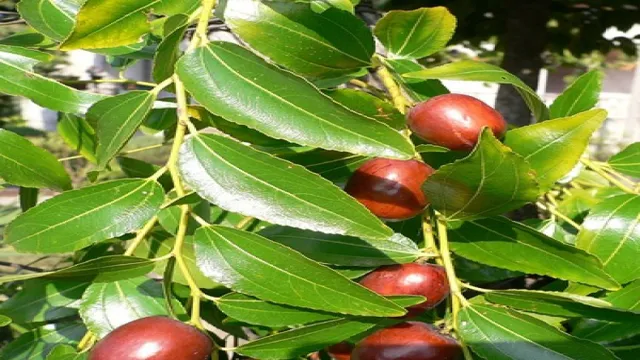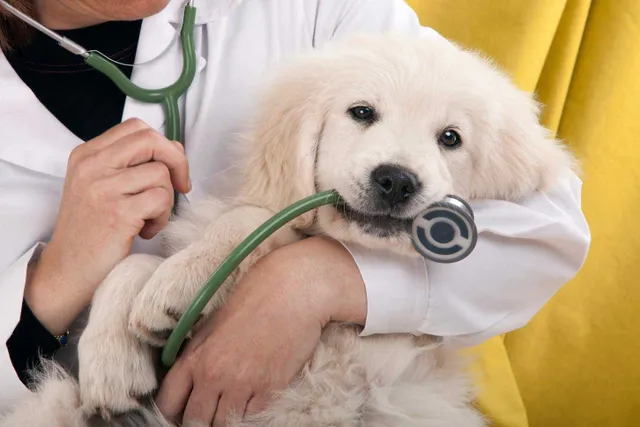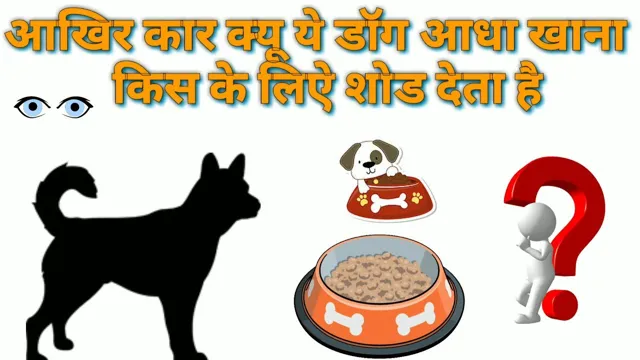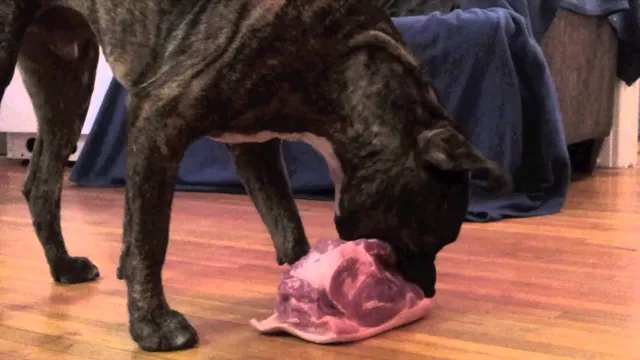Can Dogs Eat Vegetables? A Comprehensive Guide to Safe Vegetable Options for Dogs
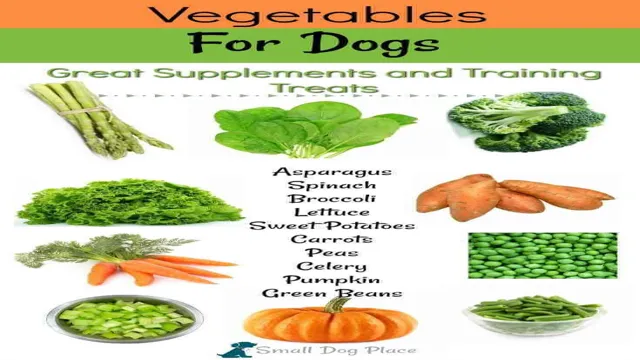
Dogs are an important part of our lives, and we want the best for them. While it’s easy to know what type of food to give your canine companion, it can be confusing to determine which vegetables are safe for them to eat. Luckily, there are a variety of veggies that are perfectly safe for your pup to consume. In this blog, we’ll dive into what vegetables can dogs eat, and why they are beneficial for their overall health.
Benefits of Feeding Dogs Vegetables
A well-balanced diet for your dog is just as important to their overall health as it is for humans. While the primary components of a dog’s diet should be a combination of protein, carbohydrates, and fats, vegetables can play a vital role in providing essential vitamins and minerals. The question is, what vegetables can dogs eat? The answer is that there are lots of vegetables that are safe and healthy for dogs. These include green beans, carrots, sweet potatoes, peas, celery, and cucumbers. All of these vegetables are packed with essential vitamins and minerals, like fiber, iron, and calcium, and they can help improve digestion, reduce the risk of cancer, and provide a healthier coat and skin.
In addition to the vegetables listed above, you can also give your pup some cooked vegetables like squash, zucchini, and broccoli. These vegetables are loaded with antioxidants, which can help protect your pup from diseases and promote healthy body function. When introducing vegetables to your pup’s diet, it’s important to start slowly and introduce only one type of vegetable at a time. This helps you to identify any potential allergies or digestive issues. Additionally, it’s best to feed your pup cooked vegetables, as raw vegetables can be difficult for them to digest.
Feeding your pup vegetables can also provide an alternate form of hydration. While dogs need plenty of fresh, clean water, adding a few cubed pieces of cucumber or celery to their meal is a great way to get them to drink more. Overall, there are many benefits to adding vegetables to your pup’s diet. As long as you take the time to introduce them slowly and in small amounts, you can help your pup reap the benefits of a healthy diet. The key is to make sure that you only feed your pup vegetables that are safe and free from toxins, as some vegetables can be
Nutritional Benefits
Did you know that there are a variety of vegetables that your pup can enjoy as part of a healthy and nutritious diet? From carrots to cucumbers to green beans, dogs can benefit from a range of vegetable-based snacks. Not only are these snacks full of vitamins and minerals, but they can also help keep your pup’s teeth clean and provide them with a healthy source of dietary fiber. So, if you’re looking for a tasty and nutritious treat for your pup, consider adding some vegetables to their diet. From crunchy carrots to sweet peas, there’s something for every pup to enjoy!
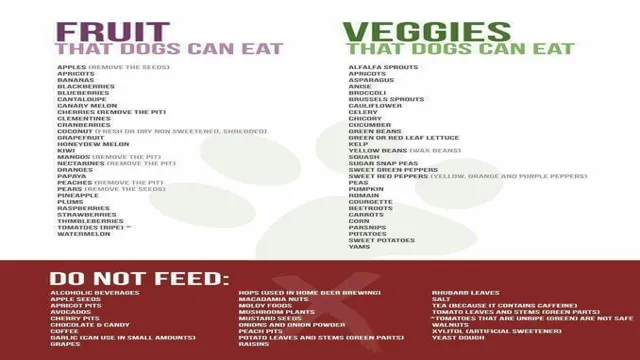
Gastrointestinal Benefits
It’s no secret that a healthy diet is essential for our four-legged friends, but not all vegetables are safe for dogs. While some vegetables can provide great gastrointestinal benefits, others can cause serious harm to your pup. So, what vegetables can dogs eat? The answer is that most vegetables are safe for dogs in moderation, but there are some exceptions. Potatoes, sweet potatoes, carrots, green beans, celery, and spinach are all safe for dogs to enjoy. On the other hand, some vegetables such as onions, garlic, and tomatoes have been known to cause gastrointestinal distress in dogs, so it is best to avoid these.
While there are plenty of vegetables your pup can enjoy, it’s important to remember to feed them in moderation as part of a balanced diet.
Types of Vegetables Dogs Can Eat
There’s no denying how much we love our furry friends, and as pet owners, it’s our responsibility to provide them with a balanced and healthy diet. While some foods can be harmful to dogs, they can benefit from a variety of vegetables as part of their regular meals. But what vegetables can dogs eat? The good news is that there are plenty of options, including some vegetables that you may have in your kitchen right now. Generally, vegetables are a great source of vitamins, minerals, antioxidants, and fiber for your pup. Of course, it’s important to make sure you’re only feeding your pup vegetables that are safe for him to eat.
Some vegetables that are safe for dogs to eat include: carrots, celery, green beans, sweet potatoes, squash, zucchini, cucumbers, and bell peppers. Carrots are a great source of beta-carotene, which is an important antioxidant for dogs. Celery is a low calorie snack that’s high in fiber and helps promote healthy digestion. Green beans are a good source of vitamins A, C, and K and offer a crunchy, nutritious snack. Sweet potatoes are packed with vitamin A, B6, and C and can help support a healthy immune system.
Squash is a great source of vitamin A and can help keep your pup’s eyesight healthy. Zucchini is full of vitamins and minerals and is a great low-calorie snack. Cucumbers are a great source of vitamins and minerals, and bell peppers are a tasty way to give your pup a vitamin C boost. In addition to the vegetables listed above, there are a few other options that you may want to consider. Spinach, kale, and broccoli are all packed with vitamins and minerals, and can be a great addition to your pup’s diet.
Asparagus is high in fiber and vitamin K, and cauliflower is a great
Green Vegetables
Green vegetables are an important part of a balanced diet for both humans and dogs alike. But, when it comes to what vegetables can dogs eat, the rules are a bit different. While some vegetables are safe and even beneficial for dogs, others could be harmful to their health. Examples of safe vegetables for dogs include broccoli, spinach, zucchini, celery, and green beans. These vegetables are packed with essential vitamins, minerals, and fiber, which can help support your pup’s digestive health, as well as provide them with important antioxidants.
On the other hand, vegetables like onions, garlic, mushrooms, and tomatoes should be avoided as they can cause digestive upset or be toxic to dogs.
Starchy Vegetables
Are you wondering what vegetables can your pup enjoy? Starchy vegetables, such as potatoes, sweet potatoes, and squash, are generally safe for dogs to eat in moderation. These vegetables are packed with nutrients, including fiber, complex carbohydrates, and vitamins and minerals. They can even help keep your pup’s digestive system running smoothly! Just be sure to cut them into small pieces and serve them cooked.

Low-Sugar Vegetables
Looking for a delicious and healthy treat for your pup? Look no further than low-sugar vegetables! Vegetables make for a great snack for dogs, as they are packed with important vitamins and minerals that help keep your pup healthy and active. Dogs can eat a variety of vegetables, including carrots, green beans, cucumbers, sweet potatoes, squash, and pumpkin. Just remember to cut up the vegetables into small pieces and avoid adding any added sugar or spices. Serving up these low-sugar vegetables to your pup will help keep their diet balanced and provide them with the nutrition they need.
How to Feed Vegetables to Dogs
Vegetables are a great way to provide your pup with the vitamins, minerals, and fiber they need, but not all vegetables are safe for dogs. It can be confusing to work out what vegetables can be safely given to your four-legged friends, so here’s a guide to feeding vegetables to your canine companion. When feeding vegetables to your pup, start with vegetables that are safe for dogs to eat. A few good options are cooked carrots, broccoli, green beans, celery, and spinach. These vegetables are packed with nutrients and can help to improve your dog’s overall health.
When introducing vegetables to your pup, it’s important to start small. Start with small amounts and work your way up as your pup gets used to the new food. It’s also important to make sure the vegetables are cooked and not raw. Raw vegetables can be difficult for dogs to digest and may cause stomach upset. If your pup is hesitant to try new foods, you can try adding in a few pieces of cooked meat or cheese to the vegetables.
This can help to make the vegetables more appealing and may encourage your pup to eat them. In addition to cooked vegetables, there are a few other vegetables that are safe for dogs to eat. These include sweet potatoes, zucchini, cucumbers, pumpkin, and squash. These vegetables can help to provide your pup with essential vitamins and minerals and can be a great way to add variety to their diet. When feeding vegetables to your pup, it’s important to make sure they are not heavily salted or seasoned.
Too much salt or seasoning can be bad for your pup’s health and can cause stomach upset. By following these tips, you can make sure your pup is getting all the nutrients they need while still enjoying the taste of vegetables. Remember, if you have any questions, it’s always best to consult with your
Safety Precautions
No matter how much your dog begs for a bite of your food, it’s important to be aware of what vegetables are safe to feed your furry friend. While some vegetables can provide essential nutrients to your pup’s diet, others can cause a variety of digestive issues, or worse. To ensure the safety of your pup, avoid feeding them onions, garlic, mushrooms, avocados, and anything with high levels of sodium. If you’re unsure if a particular vegetable is safe for your pup, consult with your veterinarian for guidance. With the right precautions and knowledge, you can safely provide your pup with the vitamins and minerals they need for a healthy diet.
Serving Size Guidelines
When it comes to feeding your beloved four-legged friend, it’s important to make sure they get the right nutrition. With so many vegetables out there, it can be hard to know what vegetables can dogs eat. Luckily, there are some general serving size guidelines you can follow to ensure your pup is getting the nutrition they need. When it comes to vegetables, you should make sure to feed your pup only small amounts at a time. Vegetables such as broccoli, cucumbers, carrots, kale, and spinach are all safe for dogs.
Be sure to chop them into small pieces to avoid choking hazards. Additionally, make sure to cook any vegetables before serving them to your pup. This will help make them easier for them to digest. Lastly, always consult your vet before introducing any new foods into your pup’s diet.
Conclusion
So there you have it, the answer to the age-old question of what vegetables dogs can eat! As it turns out, many vegetables are safe and healthy for dogs to eat, and provide a great source of vitamins and minerals. However, there are a few vegetables that are best avoided, so it’s important to check with your vet before feeding any new vegetable to your pup. All in all, there are plenty of vegetables that your pup can enjoy, so don’t be afraid to get creative in the kitchen and give your pup a tasty, healthy snack!”
FAQs
What vegetables can dogs eat?
Generally speaking, dogs can eat most vegetables, such as carrots, green beans, spinach, and cucumbers. However, some vegetables should be avoided, such as garlic, onions, and potatoes.
Are tomato plants safe for dogs?
Yes, tomato plants are generally safe for dogs. However, the leaves, stems, and unripe fruit contain small amounts of toxic compounds and should not be consumed.
Are peppers safe for dogs?
Yes, peppers are generally safe for dogs. However, they should be served in small amounts as they may cause stomach upset in some dogs.
Are mushrooms safe for dogs?
No, mushrooms are not safe for dogs and can be toxic. If your dog has consumed mushrooms, contact your veterinarian immediately.
Can dogs eat broccoli?
Yes, dogs can eat broccoli in small amounts. However, the stems and leaves should be removed as they can be difficult to digest.
Are cauliflower florets safe for dogs?
Yes, cauliflower florets are generally safe for dogs. However, like most vegetables, they should be served in small amounts.
